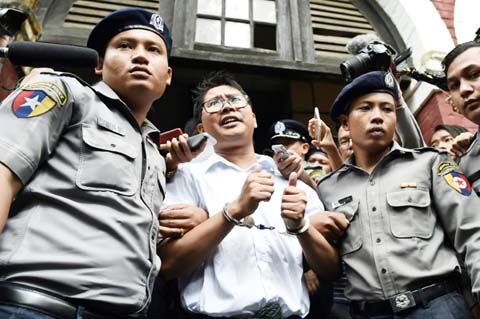
AFP :
Lawyers for two Myanmar Reuters journalists filed an appeal Monday against their seven-year jail sentence linked to their reporting on the Rohingya crisis, the news agency said.
Wa Lone, 32, and Kyaw Soe Oo, 28, were found guilty under a state secrets act in September after exposing the extrajudicial killing of 10 Rohingya men during a brutal military crackdown last year.
The verdict-following what was widely viewed as a sham trial held to intimidate Myanmar’s nascent community of journalists-sparked widespread condemnation.
Reuters president and editor-in-chief Stephen J Adler said in a statement the ruling ignored “compelling evidence” that the two reporters had been framed by the authorities.
“We filed an appeal today on behalf of Wa Lone and Kyaw Soe Oo because the trial court’s ruling was wrong,” he said.
“In condemning them as spies, it ignored compelling evidence of a police set-up, serious due process violations and the prosecution’s failure to prove any of the key elements of the crime.” During the trial, one whistleblowing police officer told the court how a superior had ordered his men to set up a sting to entrap the reporters-testimony the judge chose to ignore.
Myanmar’s civilian leader Aung San Suu Kyi was widely criticised for refusing to intervene even though her government had the power to drop the charges.
President Win Myint-a proxy of Suu Kyi-has the power to pardon the reporters but has so far not commented on the case.
The High Court is likely to take up to five or six months to rule on the appeal, during which time the reporters will remain in prison.
The pair were investigating the massacre of 10 Rohingya men by security forces in Inn Din village in western Rakhine state, an atrocity to which the military later admitted in a rare acknowledgement of wrongdoing.
Myanmar troops, aided by mobs of ethnic Rakhine Buddhists, drove out more than 720,000 Rohingya from Rakhine state last year, forcing them into sprawling camps in neighbouring Bangladesh.
The refugees brought with them consistent testimony of widespread murder, rape, torture and arson.
UN investigators say the violence warrants the prosecution of top generals for an “ongoing genocide”, war crimes and crimes against humanity at the International Criminal Court (ICC).
Myanmar insists that the campaign in Rakhine was a proportionate response to Rohingya militant attacks on security forces and vehemently rejects the ICC’s jurisdiction over the country.
After numerous delays, the first significant group of Rohingya-some 2,000 strong-is due to return to Myanmar on November 15 as part of a repatriation deal signed with Bangladesh a year ago.
However, the UN and rights groups maintain that conditions for their “safe, dignified and sustainable” return are still not in place.

